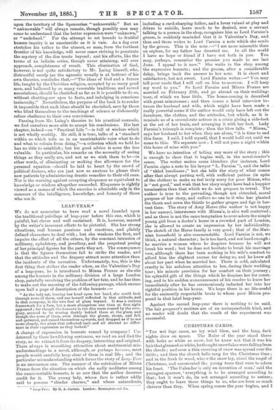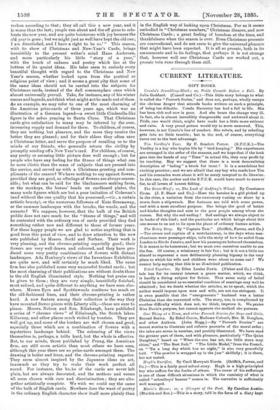CHRISTMAS CARDS.
"THE wet fogs came, an icy wind blew, and the long, dark nights drew on apace. The Ruler of the year stood there with locks as white as snow, but he knew not that it was his hair that gleamed so white, he thought snowflakes were falling from the clouds ; and soon a thin covering of snow was spread over the fields ; and then the church bells rang for the Christmas time ; and in the fresh fir wood, where the snow lay, stood the angel of Christmas, and consecrated the young trees that were to adorn his feast. The Calendar is only an invention of man,' said the youngest sparrow, everything is to be arranged according to that ; but it won't do, its not arranged according to nature ; they ought to leave, those things to us, who are born so much cleverer than they. When spring comes the year begins, and I reckon according to that ; they all call this a new year, and it is worse than the last ; people run about and fire off guns to cele- brate the new year, and are quite boisterous with joy because the old year-is gone ; but we might just as well have kept the old one ; I am dissatisfied, and I have a right to be so.' " This season, with its show of Christmas and New-Year's Cards, brings irresistibly to the present writer's mind Hans Andersen, and more particularly his little " story of a year," with the touch of sadness and poetry which lies at the bottom of its quaint ideas. His tales seem to embody every beautiful thought with regard to the Christmas and New Year's season, whether looked upon from the poetical or religions point of view ; and it seems a great pity that some of the same ideas should not be carried into the subjects for Christmas cards, instead of the dull commonplace ones which almost universally prevail. Take, for instance, any of his winter scenes and legends, and think what might not be made out of them. As an example, we may refer to one of the most charming of the American prize-cards of three years ago, which was an illustration of a German legend—a sweet little Cinderella-like figure in the ashes praying to Santa Claus. That Christmas cards give satisfaction to many may be inferred by the ever_ increasing supply and demand for them. To children, of course, they are nothing but pleasure, and the more they receive the better they are pleased; and for their elders they often save a Christmas letter, and serve the purpose of recalling us to the minds of our friends, who generally return the civility by promptly sending off a New Year's card. For children, of course, any pretty or amusing little picture does well enough ; but for people who have any feeling for the fitness of things what can be more idiotic than the mass of subjects that are pressed into the service, and served up with a Christmas greeting and com- pliments of the season? We have nothing to say against flowers, provided they are good, as offerings of flowers are always season- able ; but what can be said for the blackamoors making faces, or the monkeys, the horses' heads on cardboard plates, the many nude figures which are but a poor imitation of Coleman's (and without the one quality that his possessed,—viz., a certain artistic beauty), or the numerous followers of Kate Greenaway, or the summer landscapes with the brooks, the woods, and the sunsets ? We suppose, however, that the bulk of the British public does not care much for the " fitness of things," and will be contented with the ordinary run of cards provided they find something rather new and different to those of former years. For these happy people we are glad to notice anything that is good from this point of view, and to draw attention to the new -sets published by Messrs. Sockl and Nathan. Their work is very pleasing, and the chromo-printing especially good; their flowers are very well drawn and coloured, and they have pro- duced some very pretty combinations of flowers with distant landscapes. Ada Hanbury's views of the Inventions Exhibition are quite new, and will certainly be much liked. The same firm has also published some very successful frosted cards ; but the most charming of their publications are without doubt those in the old English illuminated style. Nothing but praise can be given to them ; they are very simple, beautifully finished, most refined, and quite different to anything we have seen else- where. _Messrs Eyre and Spottiswoode continue too much on the old-fashioned lines, and their chromo-printing is rather hard. A new feature among their collection is the way they have mounted flower-pieces with Liberty silk,—these are sure to please. Messrs. Nelson and Son, Edinburgh, have published a series of " chromo views " of Edinburgh, the Scotch lakes, Killarney, and other places much visited by tourists. They are well got up, and some of the borders are well chosen and good, especially those which are a combination of flowers with a mysterious landscape behind. The colouring of the views themselves is, perhaps, a trifle hard, but the whole is effective. But, to our minds, those published by Prang, the American firm, are still more artistic than most others we have seen, although this year there are no prize-cards amongst them. The drawing is better and freer, and the chromo-printing superior. They seem almost inspired by the Japanese ideas on art, inasmuch as they try to make their work perfect all round. For instance, the backs of the cards are never left plain, but are always decorated, and the mottoes and verses all seem chosen with care and discrimination ; they are alto- gether artistically complete. We wish we could say the same of the bulk of English cards. Nowhere does the want of poetry in the ordinary English character show itself more plainly than
in the English way of looking upon Christmas. For us it seems embodied in "Christmas numbers," Christmas dinners, and now Christmas Cards ; a great feeling of boredom at the time, and thankfulness when the season is over. Even Christmas presents are conventional, and do not seem to give the universal pleasure that might have been expected. It is all so prosaic, both in its amusements and in its feelings, that perhaps it is not strange that, however well our Christmas Cards are worked out, a prosaic vein runs through them still.



































 Previous page
Previous page